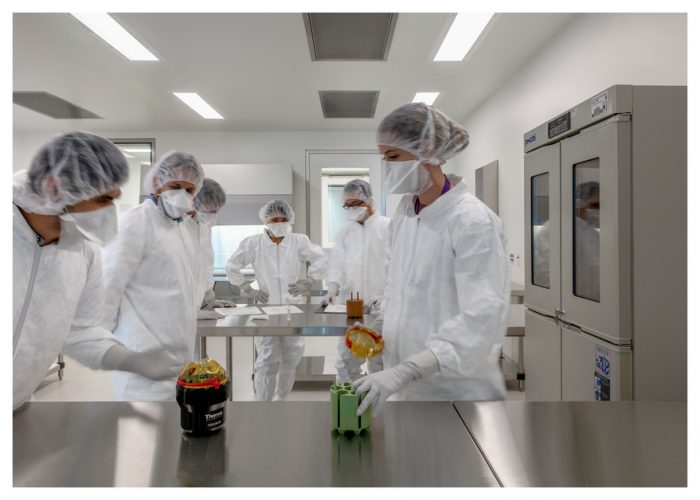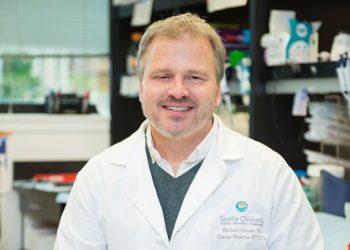Cancer Research at Seattle Children’s Contributes to FDA Approval of CAR T-Cell Immunotherapy Treatment for Adults with Relapsed or Refractory Large B-Cell Lymphoma
2.8.2021 | Joy Jernigan

The Therapeutics Cell Manufacturing facility at Building Cure translates laboratory discoveries into real-world treatments.
The U.S. Food and Drug Administration on Feb. 5 approved Bristol Myers Squibb’s Breyanzi, a chimeric antigen receptor (CAR) T-cell therapy used to treat adults with certain types of large B-cell lymphoma who have not responded to or who have relapsed after standard treatments.
The approval was supported by research at Seattle Children’s, including the chimeric antigen receptor (CAR) T-cell product, patient product manufacturing for Juno Therapeutics’ TRANSCEND trial, and data from the Pediatric Leukemia Adoptive Therapy (PLAT-02) clinical trial. In the PLAT-02 clinical trial, 93% of patients with relapsed or refractory acute lymphoblastic leukemia achieved initial remission, and about 50% were still in remission one year after therapy. Juno Therapeutics was acquired by Celgene and then Bristol Myers Squibb.
Breyanzi (lisocabtagene maraleucel or liso-cel) is the third gene therapy approved by the FDA for certain types of non-Hodgkin lymphoma, including diffuse large B-cell lymphoma.
Advancing therapies for children

Dr. Michael Jensen, vice president, Seattle Children’s Therapeutics, and chief therapeutics officer, said the FDA often licenses new therapies first for adults. He hopes Bristol Myers Squibb will follow through to secure approval to use Breyanzi in children so that one-day CAR T-cell therapy may become a front-line treatment for children with cancer.
“This is an example of what Seattle Children’s Therapeutics is designed to do,” said Jensen. “By having Seattle Children’s at the lead of therapeutics development, we hope more therapies will eventually be approved for kids.”
Dr. Jensen brought his CAR T-cell immunotherapy research program to Seattle Children’s in 2010 with the formation of the Ben Towne Center for Childhood Cancer Research and the establishment of a Therapeutics Cell Manufacturing facility that translates laboratory discoveries into real-world treatments. Together with Dr. Julie Park and Dr. Rebecca Gardner, the team launched the PLAT clinical trials for children and young adults with relapsed or refractory acute leukemia or lymphoma who were not likely to survive with current treatments.
Greta Oberhofer, age 7, was the first patient under age 2 included in Seattle Children’s PLAT-02 clinical trial. Her parents once considered hospice care for their 13-month-old daughter. Today, Greta has been in remission for six years.
The generosity of donors and the success of CAR T-cell immunotherapy research enabled Seattle Children’s in 2020 to form Seattle Children’s Therapeutics, a novel non-profit therapeutics development enterprise devoted to developing and testing next-generation cell and gene therapies for childhood cancer and other pediatric diseases. Seattle Children’s Therapeutics to date has received 14 FDA authorized Investigational New Drug (IND) applications and has expanded CAR T-cell clinical trials from leukemia and lymphoma to solid tumors and brain tumors.
More than 300 children, adolescents and young adults to date have participated in CAR T-cell immunotherapy clinical trials at Seattle Children’s.
“Today Seattle Children’s took another step in advancing immunotherapy treatments for children with cancer,” said Dr. Jeff Sperring, Seattle Children’s CEO. “We’re committed to harnessing the best science has to offer to help children everywhere lead healthy lives and achieve their full potential.”
Collaborations fuel better outcomes for children
Over the last few years, research at Seattle Children’s has led to other collaborations with industry partners, including Casebia Therapeutics and CSL Behring, and the establishment of new biotech companies including GentiBio, Umoja Biopharma and Be Biopharma. These industry collaborations have led to millions of dollars of direct investment in continued research and development of novel therapeutics. Seattle Children’s Research Institute’s Intellectual Property Core works to support the commercialization of intellectual property generated by Seattle Children’s researchers and clinicians so innovations can lead to better outcomes for children with childhood diseases.
About Seattle Children’s Therapeutics
Seattle Children’s Therapeutics is a novel non-profit therapeutics development enterprise devoted to envisioning and testing next-generation cell and gene therapies for pediatric diseases so children have the medicines they deserve. While currently focused on cancer, Seattle Children’s Therapeutics plans to expand its focus to a host of other childhood diseases that are amenable to treatment using genetic and cellular therapies.